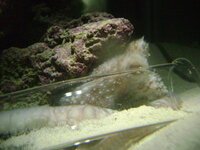CaptFish has had similar success with Legs and hopefully, he will also detail his approach.
Here are the steps I have used successfully with a macropus, two hummelincki with somewhat less success with a single mercatoris (the other mercs did not respond). Unfortunately, my briareus did not respond as well (he did come out and interact daily but never really accepted/initiatiated much contact).
Start by determining a petting/play area. Take into consideration your own comforts (sometimes you will think your hand will drop off), and a place that is easily photographed (usually by someone else or with a remote and a tripod). On the outside of the aquarium, "pet" this area with your finger often, and try to include a regular time each day. Pick an area different from where you feed and keep the two separate.
When (and this will take awhile - several weeks in some cases, particularly with very young and/or nocturnal octos) the octo starts coming to that spot or chases your finger (hummelincki and aculeatus are pretty quick to do this) then repeat the procedure INSIDE the tank.
At the point the octo starts to come to you (do not chase - this is usually pretty fast and may even happen the first time you try it after successful outside interaction) extend your finger in an offer to "ET" touch finger tips. At some point the oct will touch your hand (be prepared to stand awhile and don't get impatient), be ready and do not jerk (or trying not to, most of us fail this test the first time). Ultimately the octo will touch and suck down on your finger then pull. Do not move your hand toward the octo and resist the pulling. He will realize he is not getting anywhere and go off and sulk. Sometimes they jet away, sometime they curl up into an insecure ball about 6" away on the glass. If he does not release you on his own or you get uncomfortable, usually a touch on the back of the arms will be enough to encourage the octopus to free your hand. No one has reported being bitten but the object is to keep you hand free of the beak area.
Watch what the octopus does when it is no longer on the glass and determine an action that is natural for him and use this as a sign to remove your hand from the tank. Maya has to go into her den. She will "pretend" to go there and watch me. I wait until she is 2/3 inside

. As soon as I remove my hand she usually comes back out but I don't put my hand in again unless she comes to the front center of the glass. With Beldar, the signal was all arms off the glass and with OhToo, it was swimming to through the connecting tubes of the tank. The idea is to observe something they do when they are avoiding you and acknowledge it as an end of play. Always reinforce the action and keep your hand in the tank until it is performed (this is another time when being comfortable is helpful).
I do not use food as an incentive and do not
play at feeding time.
Practice this touch contact daily, eventually two things will happen. One, the octo will stop pulling and start touching without using the suckers and two, it will swim up to your hand presenting a petting area rather than reaching out with its arms. VERY lightly pet the presented area (it will be either the mantle or just in front of the eyes). This is acceptance point usually pretty obvious and the octo will approach you differently than when it is experimenting the "ET" touch. Once you have your routine established, sometimes (maybe always but others have not noted it) in the first stages of this exercise the octo will not want to play or seem to forget. Keep offering to play in the exact same way, don't chase and in about a week you should see interaction again as if there was no break. I have had sessions with mine that have lasted over two hours. As they age, the sessions get short and near the end might only last a minute or two. I have wondered if their skin becomes a little sensitive with senescence but mine have always wanted some interaction to the very end.
Lastly JOURNAL your approach and actions/reactions as you work with your octo. Recording from memory is not very accurate so an as you go add a sentence or two to the journal, even if there is no contact is helpful in remembering timing and interactions.


